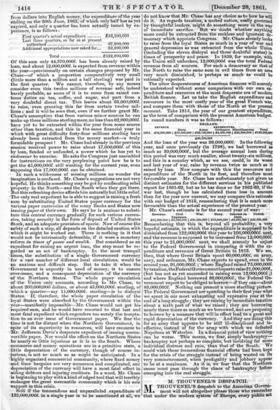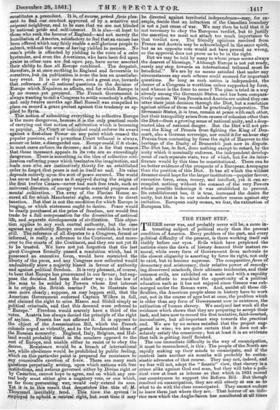M. THOUVENEL'S DESPATCH. THOITVENEL'S despatch to the American Govern- ment
will not altogether please those who remember that under the modern system of 'Europe, every pnblic act constitutes a precedent. It is, of course, primir facie plea- sant to find our conduct approved of by a sensitive and arigeant neighbour, and to be sure that we are not blinded by national pride and self-interest. It is also—at least to those who seek the honour of England—and not merely the humiliation of America, satisfactory to feel that an excuse has been offered which may fairly enable a self-glorious people to submit, without the sense of having yielded to menace. No man's pride is offended by yielding to the voice of a calm bystander, and even the Americans, who have been fed upon praise as other men are fed upon pap, have never asserted their ability to face all Europe combined. The despatch, therefore, 1B at once soothing to England and favourable to ourselves, but its publication is none the less an unsatisfac- tory event. It is one step those, and a great one, towards that reference of all national questions to the decision of • Europe which Napoleon so affects, and for which Europe is by no means yet prepared. The French Government is always wanting to call a Congress to settle somebody's affairs, and only twelve months ago Earl Russell was compelled to place on record a grave protest against this tendency as ap- plied to Syria. • This notion of submitting everything to collective Europe is the more dangerous, because it is the only practical mode of carrying out that notion of_ arbitration which is becoming so popular. , No Court ex. individual could enforce its award against a first-class Power an any point which roused the popular passions, and a powerless Court tribunal is always, sooner or later, a disregarded one. Europe could, if it chose, in most cases enforce its decrees; and it is for that reason that these incessant appeals to its vote are BO exceedingly dangerous. There is something in the idea of collective civi- lization enforcing peace which fascinates the imagination, and leads men who are instinctively thirsty for an established order to forget that peace is not in itself an end. Its value depends entirely upon the sort of peace secured. The world has never had such peace as it enjoyed during the reigns of the first twelve Ctesars—never had such free trade, such an universal direction of energy towards material progress and mental cultivation. The sway of the Flavian House se- cured all for which Manchester sighs, even down to direct taxation. But that is not the condition for which Europe is longing, or which statesmen ought to desire. Peace would be dearly purchased at the price of freedom, nor would free trade be a full compensation for the diversities of national life, and separate developments of civilization. This objec- tion applies to any such central authority, but the case against any authority Europe could now establish is heavier still. The reference of all disputes to a Congress, formal or informal, is really a reference to the Continent, and more- over to the courts of the Continent, and they are not yet fit to be trusted. We have not yet forgotten that the last great Congress formally passed a resolution which, had it possessed an executive force, would have restricted the liberty of the press, and any Congress now collected would undoubtedly show a majority biased in favour of authority and against political freedom. It is very pleasant, of course, to hear that Europe has pronounced in our favour; but sup- pose the decision had been the other way : is the law of the seas to be settled by Powers whose first interest is to cripple the British marine ? Or, to illustrate the case more clearly ; suppose as may happen still, that the American Government endorsed Captain Wilkes in full, and claimed the right to seize Mason and Slidell simply as political criminals, and that this demand were referred to Europe." Freedom would scarcely have a third of the votes. Austria has always denied the principle of the right of asylum. Prussia has not affirmed it. It is opposed to the object of the Assassination Bill, which the French colonels urged so violently, and to the fundamental ideas of the Russian monarchy. England, Italy, Belgium, and Hol- land would probably stand in the conclave opposed to the rest of Europe, and unable either to resist or to obey the decree. Resistance would be a breach of international law, while obedience would be prohibited by public feeling, which on this particular point is prepared for resistance to any conceivable exertion of force. There are many such questions perpetually arising, upon which nations with free institutions, and nations governed either by Divine right or by Cresarism, cannot hope to agree, and on which any cen- tral body must either give a nugatory vote, or one which, so far from; preventing war, would only extend its area. Yet it is to this result that despatches like this of M. Thouvenel inevitably tend. This time, the system is employed to uphold kncutral right, but next time it may be directed against territorial independence—may, for ex- ample, decide that an infraction of the Canadian boundary is not a just cause of war. We may then be told that it is not necessary to obey the European verdict, but to justify the assertion we must not attach too much importance to that verdict now. The friendly opinions received from France and Austria may be acknowledged in the same spirit, but as an opposite vote would not have proved us wrong, so the approval does not prove us to be in the right. But we may be told by many to whom peace seems always the dearest of blessings, "Although Europe is not yet ready, surely any step towards an international tribunal must be beneficial." We are by no means satisfied that under any circumstances any such scheme could succeed for important questions. So long as each nation is independent, the decree of a Congress is worthless unless supported by force, and whence is the force to come ? The plan is tried in a way already among the Germanic States, and has been compara- tively useless. When Prussia and Austria are united they can utter their joint decision through the Diet, but a resolution against either of them would be practically inoperative. The Germanic States, it is true, remain at peace with each other, but their tranquillity arises from causes of cohesion other than the Diet—from a growing sense of national unity, and a deep- rooted idea of national danger. But the Diet will not pre- vent the King of Prussia from fighting the King of Den- mark, also a German sovereign, nor could it for an hour stay Prussia from contesting by force the right of Hanover to the heritage of the Duchy of Brunswick just now in dispute. The Diet has, in fact, done nothing except to retard, by the unity which it nominally enforces, the independentdevelop- ment of each separate state, two of which, but for its inter- ference would by this time be constitutional. There can be no better evidence of the prospects of a European Areopagus than the position of this Diet. It has all which the wildest dreamer could hope for the larger institution—popular favour, executive force, arms, money, and intellect, yet it can ac- complish nothing without the consent of the very Powers whose possible bickerings it was established to prevent. Its establishment has, it is true, increased the desire for unity, but that is to our minds another reason against any imitation. European unity means, we fear, the extinction of European life.





























 Previous page
Previous page